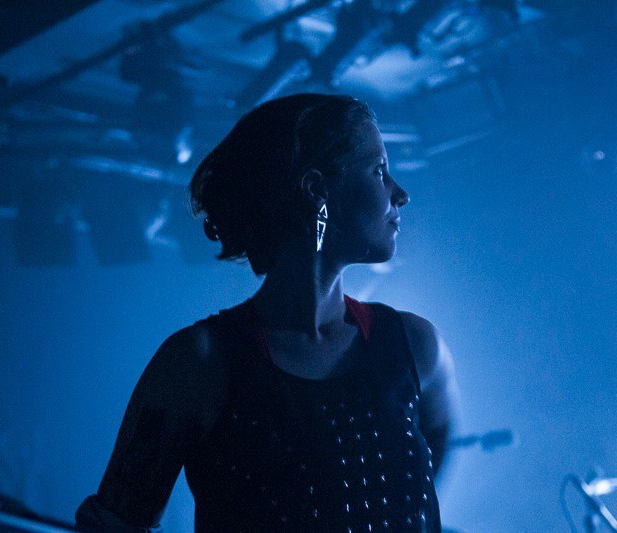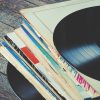Swiss producer and indie-songstress Anna Aaron initially gained notability by fellow Swiss jazz musician Sophie Hunger, prompting celebrated label Two Gentlemen Records (Fauve, The Young Gods, The Appleseed Cast) to take interest in the Basel-based artist and sign her right on the spot. Anna has since gained media attention from the likes of Swiss and German publications such as Sound Kartel, Le Canal Auditif, NBHAP, Les Inrocks, Spiegel Online just to name a few.
The latest single ‘Why Not’ by Anna Aaron is a pounding electro-tinged voyage through kaleidoscopic whirlwinds; deep driving basslines and energetic percussion stream like rivers of lightning underneath Aaron’s provocative, animated vocal presence. Her confrontational lyrics “Why not have no expectations towards yourself?” reminds us of the impact one can have in this unforgiving world.
We caught up with Anna Aaron on the magic of art and emotional telepathy:
(Be sure to stream Anna Aaron’s latest single ‘Why Not’ below!)
Set the tone for us. Why the arts?
I was drawn to the realm of music and art because it unlocks the personal, magical language of the soul which is untouched by dogma and therefore innocently spiritual, pure, powerful and dangerous all at once.
I was reading a book that introduced me to the idea that your subconscious inner world actually provides you with a magical cave of treasures you can explore and exploit as you wish. This gave me the impulse to reinterpret the images and memories I had from the time my family spent in Asia when we were children; a part of me I had mainly been trying to avoid up to then. I realized there was actually a lot of useful stuff to be found there for making art. I focused on the magical side of my experience in the sense of the exposure to a foreign spirituality and having to reconcile it with the ideas and influences that come from one’s own family. I also realized music had always been a way for me to build my own worlds while leading a life where one has to travel around a lot and deal with a feeling of uprootedness.
Which comes first when you’re producing – the sound or the idea?
Mostly I find that during the process of trying to translate a vague idea in one’s head into an actual beat or hook, something entirely different comes out, and then I continue working with that. Also, accidents are always a big part of the creative process. Accidents are underrated. Especially when you work with software it happens all the time that you move or loop something without having intended it, but then you leave it that way because it sounds great and sometimes it directs you towards a whole new set of ideas for the song.
Does your material feature any collaborations?
For the new record I collaborated with my brother Alain for the first time in the studio. I pondered for a long time if it was a good idea or not, but then we went for a long walk on a spring day and talked about my ideas and listened through my demos, and at some point this feeling of excitement suddenly rose in us and I knew it was the right decision. We spent some time working on the pre-productions and then the live-musicians I had played with on the previous tour also came into the studio for a few days. When we were done recording I sent the album to David Kosten who had produced my second album and asked him if he would be interested in mixing it, and he responded immediately and very positively, which made me very happy and also relieved me in a certain sense, because Alain and I had worked very secludedly and at that point we were not sure at all anymore if what we had done would make any sense to anyone else.
What’s on your current playlist?
While recording we used specific records as references to help us keep an eye on the direction we wanted to go – not necessarily regarding style but the intensity of the sound. For instance On The Corner by Miles Davis, Remain In Light by Talking Heads and Spirit of Eden by Talk Talk.
Tell us about the chemistry you have with your fans on stage.
I think I perform better when I can see the faces of the people in the audience. It’s important for me to make a connection. Sometimes it feels like emotional telepathy: I feel something shaking inside of me and then it becomes bigger and the others pick it up and feel it too.
What techniques do you experiment with to get your original sound?
It was important for us to define a palette of sounds for the studio, because in the age of plugins it can be helpful to restrict yourself a little in order to not get lost. We worked with the prophet 6 synthesizer, letting the arpeggiator-attacks take on a percussive role, and an old Italian transistor organ with a lovely magical sound. Little details like loops and noises I had recorded on my computer were also incorporated.
Take us through a day in the recording studio.
I record in my brother’s studio, where mostly we just talk for a very long time before we start working. There are these topics we have been discussing for many years now and the process of making a record together seemed to blend in very naturally with this. When I record alone at home I work with checklists to keep me going because it takes more discipline to have a productive studio-day when you’re working alone.
Was there a specific moment in your life where you thought, “this is what I want to do”?
Paradoxically it was at a point where I was the least secure about my abilities and my future that I felt the firmest certainty that this is what I want to do for the rest of my life. Everything seemed to point in the direction of going back to university and getting a “real job”, but it was then that I decided I would always see myself as a musician and not doubt myself anymore concerning that.
What do you keep close by while you’re playing a set?
I like to have vast amounts of coffee around when I’m working.
Any emerging artists on your radar?
My friends Odd Beholder from Zürich and Don’t Kill The Beast from Basel.
What gets your creative juices flowing?
Mostly there’s just a feeling of restlessness and then I know there’s something that wants to come out. I tend to get overwhelmed by intense waves of excitement when I write, so it’s important to be able to move. When I can’t sit still anymore at the desk I know it’s going in the right direction.
Take us through your collection of gear, tech or software that accompanies your creative expression.
When I write demos I work with Ableton Live and the Native Instruments library, the Arturia Minibrute for basslines and last summer a friend parked his Fender Rhodes in my living room for a few months which I did some demos with using the Eventide Time Factor delay and my brother’s 1072 preamp.
Any side projects you’re working on?
Sometimes I go in such weird directions when I’m working on my demos that I almost think I should call it a side project, but until now I’ve been keeping everything under the same name. If I started a side project it would be with other people but I have never done actual songwriting with anyone else so far.
How have you refined your craft since you entered the industry?
It was very important to me to become as independent as I could concerning producing but I was completely new to the field so I really had to learn a lot. Programming beats, handling software and hardware, thinking in soundscapes, understanding the spectrum of sound, all that. I was able to make a lot of progress just working alongside my brother, watching what he was doing, and listening to albums I admire and analyzing how they were made.
Breakdown the news for us: what can we expect from you this year?
We’re releasing a song and a video in May and another single in summer, preparing for the album release and the new tour with my drummer.
Order ‘Why Not’ single by Anna Aaron via iTunes
For more information follow Anna Aaron on Facebook
[Image credit: Sabine Burger]




